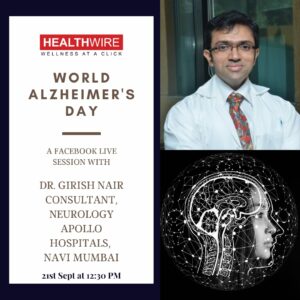
Alzheimer’s disease is the most common form of dementia. One of the most common early symptoms of Alzheimer is difficulty in remembering the recent events. Alzheimer’s patient forgets the name of the people like a longtime friend, address, even name of the roads and other things.
To address the same Dr Girish Nair, Consultant Neurology, Apollo Hospitals. Navi Mumbai joined us on Facebook Live session on ‘World Alzheimer’s Day’.
Dementia is a progressive brain disease which results in loss of memory and thinking skills. It destroys the brain cells which cause memory loss, memory changes, erratic behaviour and loss of body functions. This disease usually starts slowly but gets worse with time.
It affects memory, thinking, orientation, comprehension, calculation, learning capacity, language, and judgement. Consciousness is not affected. The impairment in cognitive function is commonly accompanied and occasionally preceded, by deterioration in emotional control, social behaviour, or motivation. Dementia results from a variety of diseases and injuries that primarily or secondarily affect the brain, such as Alzheimer’s disease or stroke.
Dementia is one of the major causes of disability and dependency among older people worldwide. It can be overwhelming, not only for the people who have it but also for their carers and families. There is often a lack of awareness and understanding of dementia, resulting in stigmatization and barriers to diagnosis and care. The impact of dementia on carers, family and society at large can be physical, psychological, social and economic.
The principals of #dementia care are:
-Early diagnosis
-Optimizing physical health, cognition, activity & well-being
-Identifying & treating accompanying physical illness
-Detecting & treating behavioural & psychological symptoms
-Providing information & support to carers pic.twitter.com/GDBiHDhdAb— World Health Organization (WHO) (@WHO) September 21, 2020
Dementia: Signs and symptoms
The signs and symptoms linked to dementia can be understood in three stages.
Common symptoms in early stages are- forgetfulness, losing track of the time, becoming lost in familiar places. As dementia progresses to the middle stage, the signs and symptoms include: becoming forgetful of recent events and people’s names, having increasing difficulty with communication, experiencing behaviour changes, including wandering and repeated questioning.
Memory disturbances are serious and the physical signs and symptoms become more obvious. Symptoms include: becoming unaware of the time and place, having an increasing need for assisted self-care, behaviour changes that may escalate and include aggression.
Dementia: Treatment and care
There is no treatment currently available to cure dementia or to alter its progressive course. However, much can be offered to support and improve the lives of people with dementia and their carers and families: optimizing physical health, cognition, activity and well-being, identifying and treating accompanying physical illness, providing information and long-term support to carers.
Studies show that people can reduce their risk of dementia by getting regular exercise, not smoking, avoiding harmful use of alcohol, controlling their weight, eating a healthy diet, and maintaining healthy blood pressure, cholesterol and blood sugar levels. Additional risk factors include depression, low educational attainment, social isolation, and cognitive inactivity.
Dementia can be overwhelming for the families of affected people and for their carers. Physical, emotional and financial pressures can cause great stress to families and carers, and support is required from the health, social, financial and legal systems.
https://www.facebook.com/healthwiremedia/videos/353556346001595











